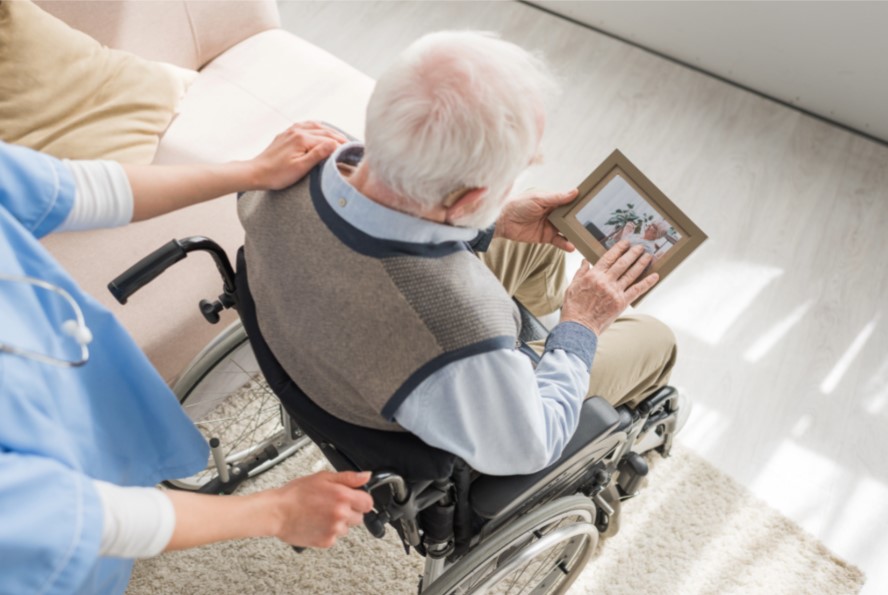
Can People With Dementia Be Cared For At Home? Yes, individuals with dementia can receive care at home. This approach provides familiarity, personalized attention, and family involvement, enhancing their quality of life. However, it requires adjustments for safety, routine, mental stimulation, and caregiver self-care.
Providing dementia care at home allows patients to stay in a familiar environment, surrounded by their loved ones. This form of health care can be more personal and flexible than what might be provided in continuing care retirement communities. However, it’s essential to understand that the medical and social needs of a person with dementia can change over time, requiring different levels of support.
At Saba Home Healthcare, we believe that with the right support, individuals with dementia can continue to live at home. Our team of certified nursing assistants and home health aides work tirelessly to provide medical care tailored to the unique needs of each individual.
From helping with everyday tasks to managing complex medical needs, our team is committed to providing compassionate and professional care. We aim to make the journey of health care for a loved one with dementia less stress inducing and more manageable for family members, ensuring they are not alone in this journey.
An Overview Understanding of Dementia
Dementia, as defined by the National Institute on Aging, is not a specific disease but a general term for a decline in mental ability that’s severe enough to interfere with daily life. Alzheimer’s disease, a condition that many are familiar with, falls under this umbrella and accounts for 60-80% of dementia cases.
Recognizing the Symptoms of Dementia
The symptoms of dementia can vary greatly, but common signs often include memory loss, difficulty communicating or finding words, confusion and disorientation, reduced ability to concentrate, and changes in personality or behavior. These symptoms start mild and gradually worsen over time as dementia progresses.
The Progression of Dementia
Understanding how dementia progresses is important, especially for family caregivers. In the early stages, a person with dementia might still be quite independent, able to perform many tasks with minimal assistance. However, as the disease advances, they will likely need increasing help with activities of daily living, such as dressing, bathing, eating, and toileting.

The Role of Family Caregivers in Dementia Care
Family caregivers play a critical role in dementia care. They are often the first to notice the early symptoms in a family member, from forgetfulness of familiar tasks to struggles with language. As dementia progresses, family caregivers might find the need for in-home care becomes more apparent, whether that involves enlisting help from other family members, hiring professional caregivers, or considering a transition to a care facility.
Meeting Personal Care Needs in Dementia
As dementia progresses, personal care needs will change and likely increase. This can include a range of activities of daily living, from basic hygiene to meal preparation. For family caregivers, meeting these evolving personal care needs can be both challenging and rewarding. With patience, flexibility, and a strong support network, family caregivers can provide their loved ones with the care they need while also taking care of their own well-being.
The Possibility of Home Care for Dementia Patients
For family caregivers, the possibility of home memory care for a loved one with dementia is more than just a consideration – it’s a beacon of hope. With the progression of dementia, the need for comprehensive and compassionate care becomes increasingly apparent. That’s where Saba Home Healthcare, a family-owned business based in Ocean County, New Jersey, steps in.
Saba Home Healthcare provides a wide range of services that cater to children, adults, and geriatric patients. Our offerings include short-term transitional care, live-in 24-hour care, skilled nursing services, companion care, hospice and end-of-life care, and certified aides for personal care services. Our vision is to be at the cutting-edge of the home health care industry by providing quality care and services to all in need.
The Benefits of Home Care for Dementia Patients
Home care offers numerous benefits for dementia care patients. It allows them to stay in a familiar environment. This can provide comfort and reduce feelings of confusion or disorientation that are often associated with dementia.
In home memory care can be tailored to the individual’s needs and preferences, offering a level of personalization that isn’t always possible in care facilities. This personalized approach can significantly enhance the quality of life for the person with dementia.
Home care enables family member caregivers to be actively involved in their loved one’s care. It provides an opportunity to work closely with healthcare professionals, learning valuable skills and strategies for managing the challenges that come with dementia.
Saba Home Healthcare understands the unique challenges faced by those caring for a loved one with dementia. We are committed to providing high-quality home care services that not only meet the medical needs of dementia patients but also provide emotional assistance and respite for a family caregiver. By choosing home care, families can ensure their loved ones receive the very best care while staying in the comfort of their own home.
Essential Aspects of Home Care for Dementia Patients
Caring for a loved one with dementia at home involves more than just meeting their physical needs. It’s about creating a safe, structured environment that promotes mental stimulation and social interaction while managing any challenging behaviors. It’s also about ensuring dementia caregivers take care of their own well-being.
Ensuring a Safe Environment
As the disease progresses, cognitive decline can increase the risk of accidents at home. Caregivers should make necessary modifications to the home, such as installing safety locks, removing tripping hazards, and providing adequate lighting, to ensure a safer living environment.
Caring for individuals with dementia involves creating a space that prioritizes safety. According to the Alzheimer’s Association, safety features play a crucial role in mitigating risks associated with cognitive decline. Johns Hopkins researchers emphasize the importance of tailoring home safety to specific chronic conditions and everyday activities.
Incorporating Safety into Everyday Activities
Safety should seamlessly integrate into daily routines. This involves making decisions that facilitate both safety and independence in daily activities. For instance, the decision-making process could involve simplifying all the areas of the home and ensuring that essential items are easily accessible.

Beyond Safety: Enhancing Quality of Life
Safety features extend beyond the physical aspects of the home. Emotional and mental well-being is equally vital. Services provided by organizations like the Alzheimer’s Association often encompass not only safety guidelines but also help for decision-making processes, ensuring a holistic approach to care.
Necessity of Routine and Structure
People with dementia often thrive on routine and structure, which can provide a sense of security and reduce confusion. A daily routine might include set times for meals, medication, personal care, activities, and bedtime. The routine should be flexible enough to accommodate the individual’s changing needs and preferences.
Importance of Mental Stimulation and Social Interaction
Engaging in mentally stimulating activities and maintaining social connections can improve quality of life for people with dementia. Activities could range from puzzles and painting to listening to music or gardening. Similarly, regular social interaction, whether with family, friends, or community groups, can promote emotional well-being.
Adult day centers and other community resources with such programs and support groups can provide scheduled and optional enrichment activities while allowing a person to continue living at home, avoiding nursing homes while they continue to receive medical appointments and memory care.
Dealing with Challenging Behavior
Dementia can cause changes in behavior, leading to aggression, agitation, or wandering. Understanding the triggers for these behaviors can help manage them effectively. Non-drug strategies, such as reassurance, distraction, or changes in the environment, can often be effective in dealing with challenging behaviors.
Importance of Self-Care for Caregivers
Caring for someone with dementia can be emotionally and physically demanding. Therefore, it’s crucial for caregivers to prioritize their own self-care. This could involve regular exercise, maintaining a healthy diet, seeking assistance from others, and taking time for relaxation and leisure activities. Remember, you can’t pour from an empty cup – taking care of yourself is not a luxury, but a necessity when caring for a loved one with dementia.
Choosing 24-Hour Live-In Care for Comprehensive Support
As the needs of older adults evolve, especially when dealing with conditions like memory loss, the option of a 24-hour live-in home health aide becomes a beneficial choice. This comprehensive form of in-home care is designed to support individuals as they navigate their everyday living activities and strive to live independently.
Tailoring Care to the Home Environment
A live-in caregiver plays a pivotal role in adapting care to the home environment. This personalized approach ensures that the care plan aligns seamlessly with the surroundings, contributing to a sense of familiarity and comfort for the loved one.
Addressing Progressive Conditions with Continuous Care
For those experiencing conditions that progress over time, such as memory loss, having a caregiver around the clock is invaluable. Researchers have found that continuous care, where the caregiver is fully attuned to the individual’s evolving needs, contributes significantly to enhancing the quality of life.
Ensuring Effective Communication Skills
Communication skills are paramount in providing care, especially in the context of long-term care. Live-in caregivers, vetted and licensed by Saba Home Health Care, possess the necessary skills to engage effectively with the individual, fostering a supportive and compassionate environment.

Promoting Independence in Daily Activities
One of the key benefits of 24-hour live-in memory care is the promotion of independence in everyday living activities. Home health aides assist with tasks that may become challenging as conditions evolve, allowing the loved one to maintain a level of autonomy and engagement.
Vetting and Accreditation for Peace of Mind
At Saba Home Health Care, families can have confidence in our staff providing 24-hour live-in care. Rigorous vetting, including background checks and state licensing, ensures that we are not only skilled but also dedicated to our role in enhancing the well-being of the individual they care for.
Home Care For Patients With Dementia
In the face of dementia, the love, patience, and dedication of caregivers is nothing short of inspirational. Their willingness to adapt and grow alongside their loved ones is a testament to the power of human compassion. With the support of professional services like Saba Home Healthcare, home care can indeed be a beacon of hope, offering personalized, high-quality care within the comfort of familiar surroundings. It’s about more than just physical care – it encompasses mental stimulation, emotional support, and the promotion of a safe, structured environment.
In the journey through dementia, no one is alone. Home care services are here to walk alongside families, lighting the path through the challenges and towards better days ahead.
